LA 2028 Organizers Plan to Implement Public Transportation for a Greener Summer Games

As Los Angeles gears up to host the 2028 Summer Games, organizers are tackling the city’s notorious traffic congestion head-on. Mayor Karen Bass revealed their ambitious plan to make it a “no-car Games” during a recent announcement.
With a focus on creating a greener Los Angeles, Bass and Casey Wasserman, chairman of the LA 2028 organizing committee, shared some of the key strategies already in place to address the transportation challenges. One of the major initiatives includes bringing in thousands of buses from different parts of the country to provide efficient transportation for attendees.
Bass emphasized the importance of expanding public transportation infrastructure to support a car-free Olympic experience. She highlighted the need for collaboration with businesses to encourage employees to work remotely during the 17-day event period. This proactive approach aims to alleviate potential traffic snarls and reduce the city’s carbon footprint.
Reflecting on past Olympic Games hosted in Los Angeles, Bass noted that concerns over traffic during the 1984 Games were largely unfounded. Leveraging modern technology and lessons learned from the COVID-19 pandemic, the organizers are optimistic about implementing effective transportation solutions for the upcoming event.
While Paris has been praised for its accessible transportation network during the Games, Los Angeles faces unique challenges with its limited public transit options. Bass is working to secure commitments from local businesses to support remote work arrangements during the Games, allowing for a smoother flow of traffic throughout the city.
Addressing Key Social Issues
In addition to transportation planning, LA organizers are also focusing on addressing critical social issues, such as homelessness. With a significant homeless population in the city, the authorities are working to provide housing solutions and support services to improve the quality of life for vulnerable individuals.
Furthermore, ensuring the safety and security of participants and spectators remains a top priority for the organizers. Collaborating with federal agencies, they are developing robust security plans to create a safe environment for everyone involved in the Games.
Looking Ahead
As the 2028 Summer Games approach, the organizers are keeping a close eye on how the results of the upcoming presidential election may impact the event. Despite potential external factors, they remain confident in the unity and spirit of the Olympic movement, emphasizing that the Games will serve as a unifying force for the country.
With a budget of $6.8 billion and a commitment to sustainability, accessibility, and inclusivity, the LA 2028 organizers are shaping a transformative Olympic experience that reflects the values of the city and the global community.




